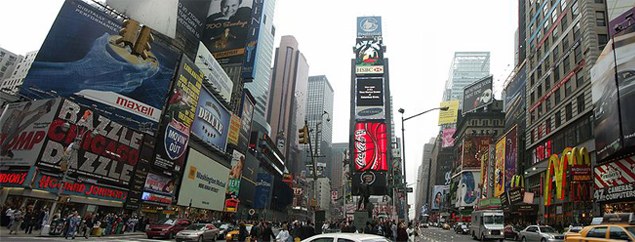Advertising
Advertising is a deliberate form of influence which causes consumers to buy products.
From the first sound of the clock radio in the morning until the early morning hours of the late night TV programme, we are exposed to about 3,000 commercials every day.
For this purpose, more then 400 billion dollars are spent for advertising worldwide every year.
Advertising is an instrument in communication politics, a subdomain of the marketing mix. Here it is next to the fields of sponsoring and promotion, of public relations, event-marketing, fairs and exhibitions, of the personal communication and the field of direct-marketing.
 Time Square in New York. Advertising space costs between 2 and 20 million dollar per month.
Time Square in New York. Advertising space costs between 2 and 20 million dollar per month.
Advertisement is put on the same level with the constitutionally guaranteed freedom of speech. With respect to this view the critic of advertising or the attempt to limit advertising is almost always considered as an offence on the system of democracy.
Nevertheless we have to realize that we are attacked by increasing âadvertising floodâ in the last years. The complete commercialisation of all business fields, the privatisation of the public sector, the stimulation of consumption and the waste of resources and thus the influence on destructive ways of life and environment is not adequately recognized according to the opinion of advertising critics. That is the reason why consumer protection associations, opponents of globalisation, consumption critics, sociologists, media critics, scientists and many other people and groups deal with the negative effects of advertising.
The most important element of advertising is not information but suggestion, whereat advertising, more or less, takes advantage of the slumbering wishes, fears, associations and desires. The result is the tendency of many people in the consumer society to identify themselves with many products and services and to make their self-confidence dependant on that. Personal happiness is achieved with the consumption of consumer goods.
Advertising has the goal to sell goods, but unfortunately deception and manipulation are often the means which shall âtemptâ people to buy and thereby the bag of tricks of manipulation is used. Not only moods are created and longings are woken up but also feelings of guilt. The housewife is then asked whether she buys the best products for her family. Advertising of for example luxury goods often focuses on moods or sometimes desires are woken up all of a sudden which were not there beforehand and which are for some people some kind of substitutional satisfaction. Advertising often creates wishes that would not be there without it. That is why superfluous products often result from that which do not have any usefulness. It is just advertising which gives many products its importance. Advertising affirms that the possession and the use of goods bring happiness and indeed even more the more goods are consummated. There are situations when we do not feel good. We have disputes with our partners, trouble at work or any other problem. This can be a reason for a few people to go shopping, whereas this can also often lead to a blindfold shopping. Whether people need it or not what they have just bought, this question is not necessarily asked. . This psychological phenomenon is called âfrustration shoppingâ and in many cases it causes (short-term) emotional well-being after bad experiences.




